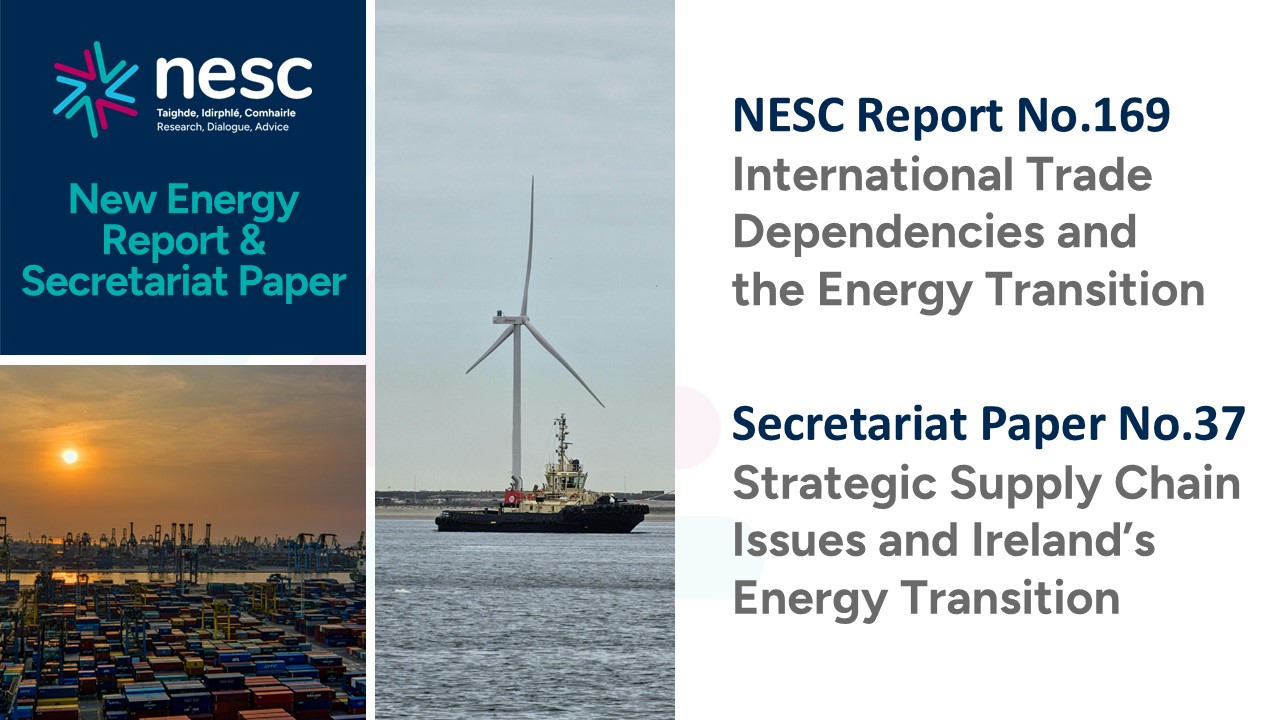You are here: Home > News & Events > Council Report No.169 – International Trade Dependencies and the Energy Transition
Council Report No.169 – International Trade Dependencies and the Energy Transition
- 30 July 2025
- Topics: Energy and renewables European Union
- Types: Press Releases

NESC Report Highlights Challenge of Transforming Ireland’s Energy Trade
- Ireland’s fossil fuel import-dependency is a strategic vulnerability.
- Cost-competitiveness challenges must be addressed if Ireland is to become a significant net exporter of renewable energy.
- The outlook for the green hydrogen sector remains uncertain, but strengthening international strategic partnerships can support its development.
30th July 2025, Dublin, Ireland: Ireland faces cost-competitiveness challenges that must be acknowledged and addressed if the country is to become a significant net exporter of renewable energy. That’s the key message in a new report from the National Economic and Social Council (NESC) which examines how Ireland’s energy trade will evolve over the energy transition, moving away from reliance on imported fossil fuels towards a more complex and interdependent European energy system based on renewables.
“The energy transition will not insulate us from developments beyond our borders,” said Dr David Hallinan, Policy Analyst at NESC. “Ireland is an island—but we’re part of a European energy system. The international trading environment and domestic energy system will remain deeply intertwined. To lead in clean energy, we need to invest strategically, contain costs, and work more closely with our neighbours.”
Ireland is currently among the most fossil fuel import-dependent countries in Europe, exposing households and businesses to price volatility on international markets and geopolitical risks. Unless reliance on imported fossil fuels is dramatically reduced, Ireland risks worsening climate change and substantial EU fines. The report recommends redirecting fiscal resources away from inefficient fossil fuel subsidies to accelerate the energy transition and shift economic incentives toward investment in renewables.
Events such as the war in Ukraine and conflict in the Middle East highlight the need for strategic energy reserves to act as a buffer in the event of a major prolonged disruption to international energy supplies. The report proposes that Ireland should formulate a long-term national plan for strategic clean energy reserves based on zero-carbon fuels such as green hydrogen and biomethane, in line with national commitments to decarbonise the energy system.
Recent data cited in the report shows that electricity exports from Ireland have fallen in recent years, while imports have surged. The primary driver of this has been the availability of cheaper electricity imports from Great Britain. As Ireland’s interconnector with France will become operational in 2026, the availability of cheap electricity imports will increase further. Ireland’s electricity is more expensive than in these larger markets due to a combination of factors, including a high degree of reliance on natural gas, grid bottlenecks, geographic isolation, and the absence of nuclear power. Ireland’s ambition to become a major net exporter of renewable electricity risks being undermined unless policymakers act swiftly to address cost competitiveness challenges.
Green hydrogen is another pillar of Ireland’s decarbonisation strategy and renewable energy export potential, mainly focussed on decarbonising hard-to-electrify sectors. The report cautions that the outlook for the sector remains uncertain and points out that domestic hydrogen demand alone will not justify large-scale infrastructure investment. Without guaranteed export pathways and demand certainty, green hydrogen risks becoming another stranded asset. Ireland will need to develop strategies for cost-competitive green hydrogen production while fostering strategic partnerships with countries that will be significant importers of green hydrogen in future.
The report also highlights the need to place a strategic focus on maximising domestic use of Ireland’s vast renewable energy resources to achieve strategic resilience, industrial decarbonisation, and to meet legally binding emissions reduction targets.
Dr Hallinan added: “Ireland must not view itself in isolation. Our energy future is European, and it must be built on shared planning, shared investment, and shared ambition. We will remain deeply interdependent through trade in electricity, trade in zero carbon fuels, trans-national infrastructure, and trade in renewable energy technologies.
“The race to become a global leader in renewable energy trade will not be won on policy ambition alone. There are real concerns about the slow pace of energy infrastructure delivery. Projects to expand the grid, develop offshore wind farms, and upgrade port infrastructure are moving too slowly.
“Future investment decisions must be supported by European frameworks for joint planning and cost-sharing, as well as strategic partnerships with countries that will be significant importers of renewable energy commodities in future. These mechanisms are vital to ensuring Ireland’s renewable energy exports can be sold into European markets competitively and reliably.
“If Ireland is to realise its ambition of becoming a significant net exporter of renewable energy commodities, we must address the root causes of high domestic electricity prices. Our ability to export clean energy will depend on how effectively we address these fundamentals.”
On the publication of the report, Dr Larry O’Connell, Director of NESC, added that: “Ireland has the natural resources and the policy ambition to become a clean energy powerhouse, but this potential will only be realised if policymakers address serious structural challenges head-on. What we need is a coordinated national response that integrates energy, trade, security, and industrial policy.”
This NESC report is the second to be published in 2025, from a body of work on the topic of energy policy (as part of our strategic outcome to reframe, refresh and improve current policy options).
To read the report in full please click HERE.
Also being published today is a supplementary NESC Secretariat research paper titled Strategic Supply Chain Issues & Ireland’s Energy Transition, which examines three thematic areas: the international wind technology supply chain; carbon emissions embedded in trade; and the international biofuel supply chain – you can access it now by clicking here.
ENDS
For further information, contact:
Marie Lynch, Carr Communications,
e: marie@carrcommunications.ie | m: 087 973 0522


